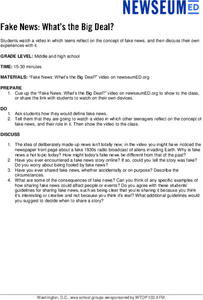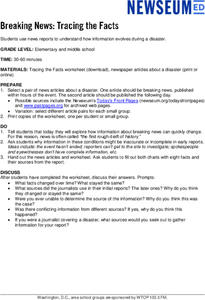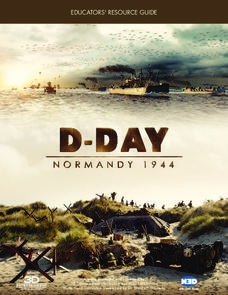American Press Institute
Media Literacy: Where News Comes From
What actually happens at a press conference? Make sense of the mayhem with a mock press conference activity designed to promote media literacy. Individuals participate as either members of the press or the governor's office to examine...
Newseum
Fake News — What's the Big Deal?
In a time of fake news and alternative facts, young people must have the ability to identify it and its role. Scholars watch a video of teens reflecting on the concept of fake news and the impact of sharing fake news stories. They then...
Newseum
The Fundamentals of News
A short video introduces middle schoolers to different media-related news terms. Viewers then complete a worksheet and discuss the differences between news and journalism, between facts and opinions.
Newseum
Free Press Challenges Through History: Analyzing Historical Sources
The debate over the integrity of stories in media is not new. Young journalists analyze historical sources that reveal freedom of the press controversies and draw parallels to challenges freedom of the press faces today.
Newseum
When the News Media Make Mistakes
Mistakes happen. When they happen in news reporting, be it in print or on the internet, journalism ethics requires that the errors be corrected. Young journalists use an Accuracy Checklist to track how news organizations post corrections...
Newseum
The Press and the Presidency: Friend or Foe? How the President Is Portrayed
In theory, news reports should be fair and unbiased. Young journalists test this theory by selecting a current news story covered by various media outlets about the President of the United States. They then locate and analyze five...
Newseum
Breaking News: Tracing the Facts
Breaking news reports can be short of facts. Young journalists select a pair of news articles about a disaster; one published within hours of the event and the second published the following day. They examine whether facts in the report...
News Literacy Project
News Goggles: Lionel Ramos, Oklahoma Watch
Given all the recent criticism of the news media and coverage, it's crucial that young people are given the tools they need to evaluate what they see, hear, and read about current events. A video interview from "News Goggles" introduces...
Newseum
Civil Rights News Coverage: Looking Back at Bias
Not all southern newspapers covered the civil rights movement of the 1950s and 1960s. Young journalists investigate how The Lexington (Ky. Herald-Leader and The Jackson (Tenn.) Sun re-examined their coverage of the movement. After...
Newseum
Media Ethics: Fairness Formula Starts With Accuracy
As part of a study of media ethics, young journalists apply a fairness formula to news reports. They look at accuracy, balance, completeness, detachment, and ethics to determine if the reporting is fair.
Newseum
Bias Through History: Analyzing Historical Sources
Young journalists use the E.S.C.A.P.E. (evidence, source, context, audience, purpose, and execution) strategy to evaluate historical and contemporary examples of bias in the news. The class then uses the provided discussion questions to...
The New York Times
Stress Less: Understanding How Your Mind and Body Respond to Anxiety
What could be more relevant to teens and preteens than experiencing stress? Use an article from the New York Times website to practice valuable Common Core skills for informational text reading, and also get a discussion going in your...
Newseum
Civil Rights: Chronicling the Movement
Scholars investigate events in the civil rights era in their community and develop a multimedia presentation of their findings. They compare local events with national events discussed on a NewseumED timeline.
Curated OER
A Day in the Life
Students inquire about the politics and culture of Ancient Rome. In this Ancient Rome project/unit, students research life during ancient Roman times and create a newspaper with articles on politics, sports, culture, and economics.
D-Day Normandy 1944
D-Day Normandy 1944
No study of World War II would be complete without an in-depth examination of the events of June 6, 1944. Pascal Vuong's D-Day Normandy:1944, is the perfect vehicle to convey the sheer magnitude of the events that have been called the...
Other popular searches
- Broadcast News
- News Broadcast Rubric
- History News Broadcast
- Tv News Broadcast
- History of News Broadcasting
- Mock News Broadcast
- Broadcasting News
- French Newscast
- News Broadcast Jobs
- Science News Broadcast
- Writing News Broadcast
- Spanish News Broadcast
















